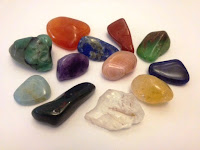Tolkien's Biblical Ties to Gemstones
Throughout history, in every
civilization, gemstones have been highly prized and sought after. The Bible
makes numerous references to jewels and precious stones and their roles. In
Tolkien’s Middle-Earth, jewels are holy in much the same way they were in
Middle Ages. Tolkien’s mythology is very similar to the Christian mythology
with gemstones and numerous comparisons can be seen. First, gemstones are made
of some special substance. Another comparison is that the jewel is mostly a
shell and it is rooted in the realm of God, and in the bible, it is seen to be
indirectly rooted in God himself. This origin in paradise gives rise to the
conception that jewels not only contain holy beauty and vitality, but wisdom as
well. This is why jewels are seen as having holy status.
 The first of many precious stones
in the Bible is mentioned in the book of Genesis. It is referenced in relation
to the creation of man and the Garden of Eden. In the Bible, jewels are
said to be made from “moisture and fire,” they are said to have a life of their
own, and Eden is said to be filled with them. Gems are described as being
alive. Tolkien continues his description of the Silmarils saying, “… Yet that
crystal was to the Silmarils but as is the body to the Children of Illuvatar:
the house of its inner fire, that is within it and yet in all parts of it, and
is its life…” The life of gems comes from God, in a similar way to the life of
God’s children. The life which jewels possess is holy in itself because that
life is of God, but jewels are special for another reason as well, they are
remnants of Eden itself (or in Tolkien’s case, of Valinor).
The first of many precious stones
in the Bible is mentioned in the book of Genesis. It is referenced in relation
to the creation of man and the Garden of Eden. In the Bible, jewels are
said to be made from “moisture and fire,” they are said to have a life of their
own, and Eden is said to be filled with them. Gems are described as being
alive. Tolkien continues his description of the Silmarils saying, “… Yet that
crystal was to the Silmarils but as is the body to the Children of Illuvatar:
the house of its inner fire, that is within it and yet in all parts of it, and
is its life…” The life of gems comes from God, in a similar way to the life of
God’s children. The life which jewels possess is holy in itself because that
life is of God, but jewels are special for another reason as well, they are
remnants of Eden itself (or in Tolkien’s case, of Valinor).
In the Silmarillion, we can see
these important elements in the Silmarils themselves. The physical form of
jewels is important. Even if a physical gem is nothing more than a case for
something more important inside, that casing must still be worthy and is
therefore special in its own right. Tolkien describes the Silmarils by stating,
“As three great jewels they were in form. But not until the End… shall it be
known of what substance they were made…” Even though the Silmarils are so much
more important than their mere physical forms, those physical forms are mighty
indeed. They cannot be marred or broken by any art in Arda, which makes further
sense in the medieval Christianity in which Tolkien frames his work. Jewels
were too hard to cut in the middle ages. No tools were great enough to shape
them in the modern sense, so it is logical to say that people thought gems were
super powerful and indestructible.
 Furthermore, the Bible claims that Satan hates jewels because they come from
Eden and hold the light of God, which burns him. Tolkien’s gems are the same.
The Silmarillion says, “And Varda hallowed the Silmarils, so that thereafter no
mortal flesh, nor hands unclean, nor anything of evil will might touch them,
but it was scorched and withered…” It cannot be overlooked that gems are holy
in the Christian mythology, and are actively the same in Tolkien’s.
Furthermore, the Bible claims that Satan hates jewels because they come from
Eden and hold the light of God, which burns him. Tolkien’s gems are the same.
The Silmarillion says, “And Varda hallowed the Silmarils, so that thereafter no
mortal flesh, nor hands unclean, nor anything of evil will might touch them,
but it was scorched and withered…” It cannot be overlooked that gems are holy
in the Christian mythology, and are actively the same in Tolkien’s. 


This is a really interesting way to look at these two things together. I was aware of how heavily Tolkien was influenced by religion and the Bible in his writings, but I wasn't aware that it extended into the realm of jewelry. I've read the Bible for years and I've never read that. It makes sense though, and I find it rather interesting what Tolkien looked at when creating his stories.
ReplyDeleteI'm really glad you brought this up! I'm in a religion class right now and we've talked extensively about Eve (the course is Women in the Bible). Overall, I think Arda reminds me of the Garden of Eden quite a bit. It's this amazing place where the children of the main god (Iluvatar) are allowed to live until they are make a decision that causes them to be exiled to a harsher land. In my class we haven't talked about jewels very much so I was really interested to read your thoughts on that point. I honestly can't say I've ever paid much attention to them in my own religious background but I like the connections you draw. I especially liked your point on that Morgoth love/hated the jewels for their light and so did Satan.
ReplyDelete